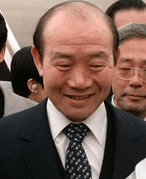1980 South Korean presidential election
Indirect presidential elections were held in South Korea on 27 August 1980 to fill the vacancy caused by President Choi Kyu-hah's resignation.
| ||||||||||||||
2,540 Deputies of Reunification Assembly 1,271 votes needed to win | ||||||||||||||
|---|---|---|---|---|---|---|---|---|---|---|---|---|---|---|
| ||||||||||||||
| ||||||||||||||
Under the 1972 Yushin Constitution, the president was elected by the National Council for Reunification, whose 2,540 members had been elected for a six-year term of office as part of the 1978 presidential elections. General Chun Doo-hwan was the only candidate, and was elected unoposed.[1]
Chun was to serve for the remainder of the 1978–1984 term of longtime president Park Chung-hee, who had died in 1979 and been replaced by Choi. However, Chun subsequently decided to end the Fourth Republic and draft a new constitution, which was promulgated in October 1980 after being approved in a referendum. The first presidential election under the new constitution was held in February 1981, and Chun was elected by an overwhelming majority.[2]
Background
After the assassination of the military dictator President Park Chung-hee in October 1979, Prime Minister Choi Kyu-hah was elected president in the December 1979 elections. However, General Chun Doo-hwan staged the Coup d'état of December Twelfth and effectively took control of the government, making President Choi a figurehead. However, on 16 August 1980, following the Coup d'état of May Seventeenth, Chun removed Choi from office so he could become president himself.
Results
In order to be elected, a candidate had to receive the vote of over 50% of the incumbent members of the National Council for Reunification. With 2,540 deputies in office, Chun had to receive at least 1,271 votes to be elected. He received 2,524 votes, 99.37% of the total possible.
| Candidate | Party | Votes |
|---|---|---|
| Chun Doo-hwan | Independent | 2,524 |
| Invalid/blank votes | 1 | |
| Abstentions | 15 | |
| Total | 2,540 | |
References
- Croissant, Aurel. "Electoral Politics in South Korea" (PDF). Friedrich Ebert Foundation. p. 266.
- Editors, History com. "South Korea". HISTORY. Retrieved 2019-03-29.CS1 maint: extra text: authors list (link)
